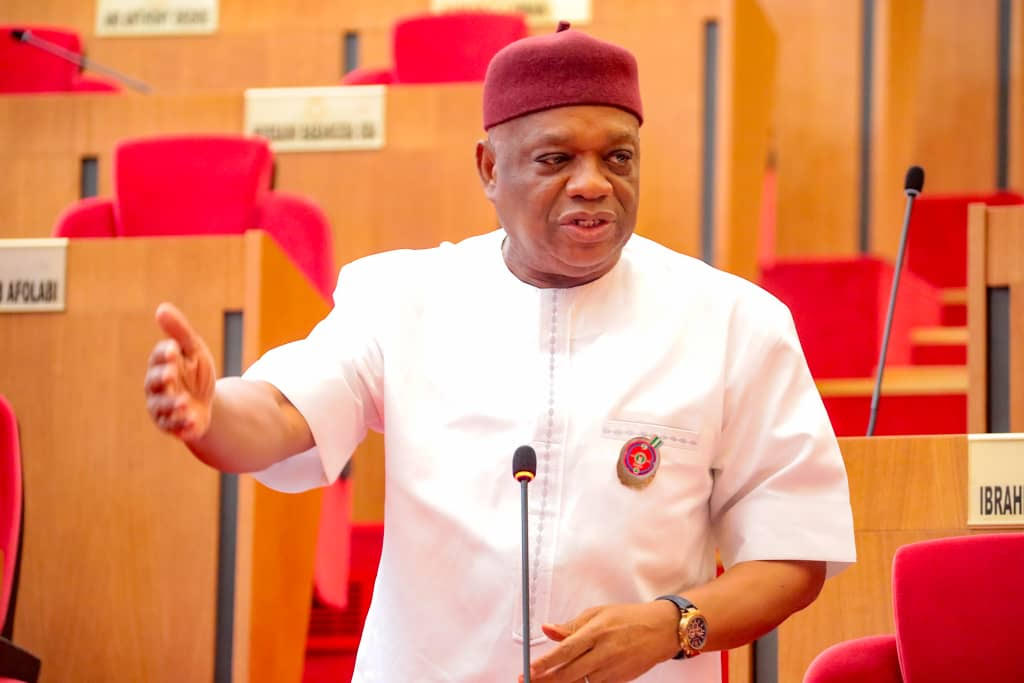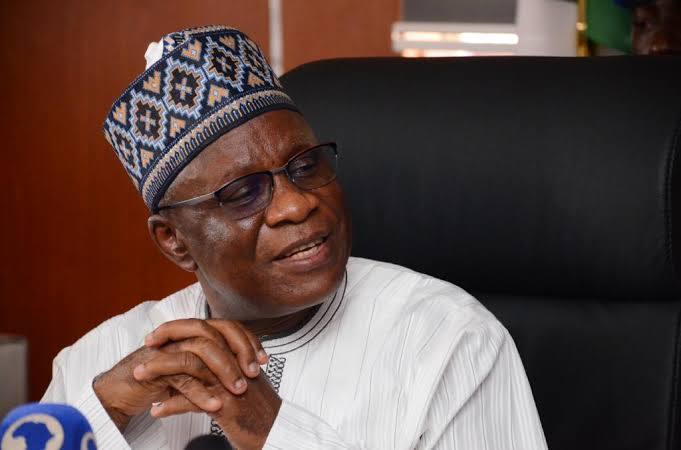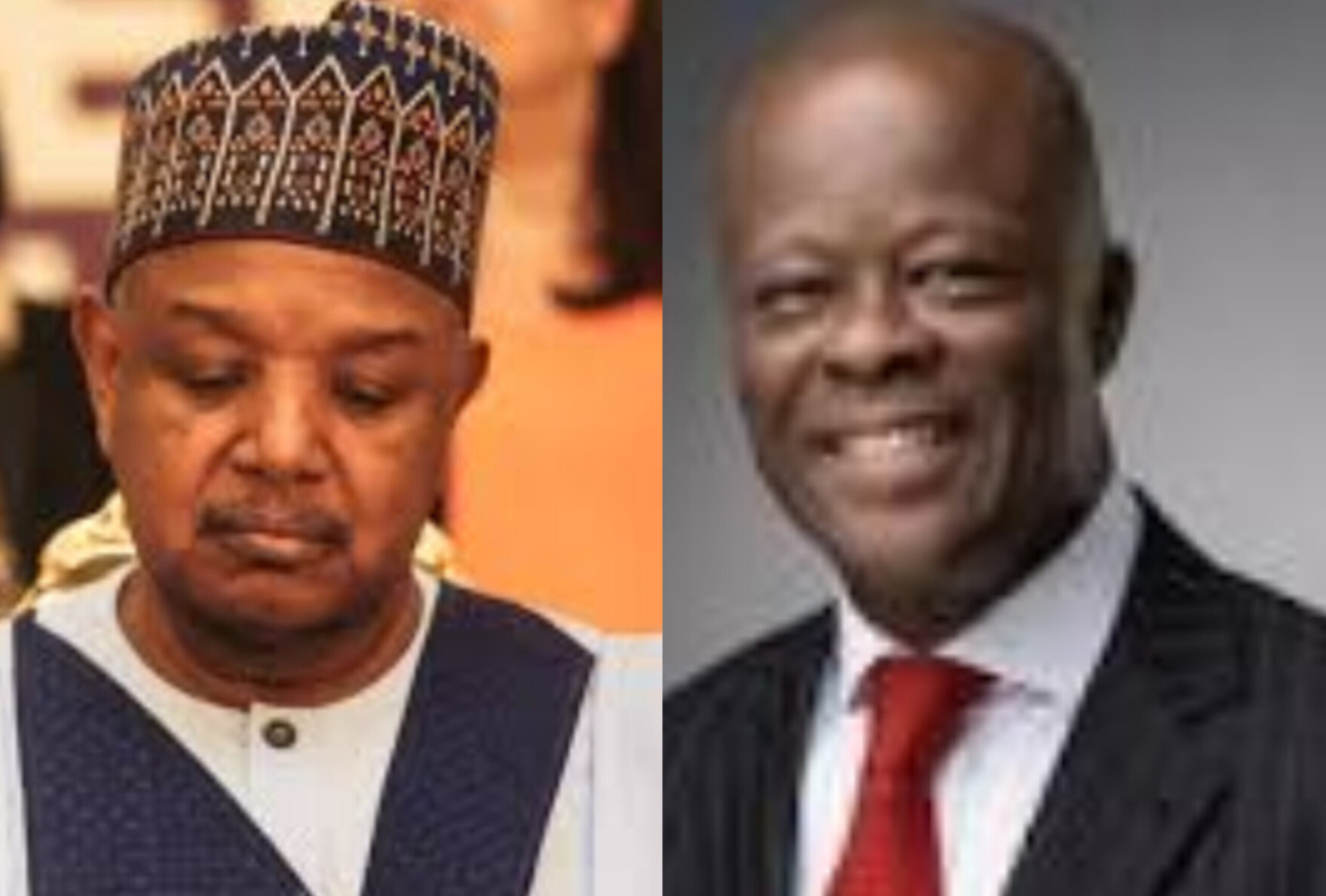Legislature
Kalu Calls for State-Level Economic Rivalry to Drive Growth Amid Tinubu’s Reform Agenda

Senator representing Abia-North Senatorial District, Orji Uzor Kalu, has championed regional economic competition among Nigeria’s 36 states as a critical catalyst for sustainable growth.
He expressed confidence that President Bola Ahmed Tinubu’s ongoing reforms will stabilize the economy and lay a solid foundation for long-term prosperity.
During a New Year’s visit to Chief Daniel Eke, a former Abia State governorship aspirant, Kalu underscored the urgent need to modernize Nigeria’s economic and legal frameworks, citing outdated policies that hinder growth and innovation.
Commending Tinubu’s Tax Reform Bills as bold and progressive, Kalu highlighted the importance of public engagement to build understanding and ensure smoother implementation.
“Economic progress requires adaptation to modern strategies,” Kalu stated. “Tinubu’s reforms address systemic issues, but Nigerians must understand their purpose to fully embrace them.”
Drawing inspiration from China’s model of regional competition, Kalu proposed an economic structure that empowers states to leverage their unique resources. He argued that such an approach would stimulate innovation, attract investments, and reduce dependence on federal allocations.
“Nigeria’s states must stop waiting for handouts from Abuja,” Kalu emphasized. “Instead, they should develop industries, harness natural resources, and compete for economic leadership—just as China’s provinces have done for decades.”
Kalu further stressed that no state in Nigeria lacks the resources to thrive but pointed to a shortage of strategic planning and competitive drive as major obstacles.
“No state is inherently poor,” he noted. “We must cultivate innovation, industrialization, and self-sufficiency to unlock Nigeria’s full potential.”
Acknowledging the economic hardships caused by reforms, Kalu appealed for patience, assuring Nigerians that tangible improvements will emerge in 2025.
“Economic restructuring is never painless,” he admitted. “But the administration is aware of the challenges and is committed to easing the transition.”
Chief Daniel Eke echoed Kalu’s sentiments, commending his focus on sustainable empowerment and infrastructure, as opposed to superficial interventions.
“Senator Kalu is investing in industries and job creation rather than distributing frying pans as empowerment tools,” Eke remarked. “This is the leadership Nigeria needs.”
Kalu reaffirmed his commitment to prioritizing grassroots empowerment and infrastructure development. He emphasized that his transition from private business to public service was driven by a desire to uplift Nigerians.
“I left my multimillion-dollar businesses to serve as Senator,” Kalu declared. “My focus remains on policies and programs that foster economic growth and improve lives.”
Kalu concluded with a call for reforming outdated laws, building more educational institutions, and enabling each region to harness its full potential.
“Economic reforms, regional competition, and resilience will transform Nigeria,” he said. “We must approach this journey with determination and patience to build a more competitive and prosperous nation.”
Legislature
Beyond Recovery: How Tinubu’s Economic Reforms are Redefining Nigeria’s Growth Path

President Bola Tinubu’s economic reforms are not just about recovery, they represent a deliberate recalibration of Nigeria’s growth strategy.
As Minister of Budget and Economic Planning, Senator Abubakar Bagudu, outlined during a budget defense session, the administration’s bold initiatives under the Renewed Hope Agenda are setting the foundation for long-term transformation.
While much attention has been given to immediate impacts, such as GDP growth surpassing 3% over three consecutive quarters, a deeper look reveals a shift in priorities toward structural reforms aimed at sustainability.
Bagudu credited the removal of fuel and forex subsidies for boosting state and local government revenues while addressing deficits and enforcing fiscal discipline.
However, the broader narrative is the government’s focus on rethinking financing and economic diversification.
The 2025 budget emphasizes innovative mechanisms like the Renewed Hope Infrastructure Fund, Consumer Credit Schemes, and the CNG Energy Transition Program, which aim to accelerate infrastructure development while generating revenue.
These initiatives signal a departure from reliance on traditional revenue streams, positioning Nigeria as a hub for modern economic practices.
The administration’s aggressive measures to curb oil theft and enhance crude production have not only stabilized revenues but also attracted international recognition.
Strategic partnerships with China, Japan, and Saudi Arabia, along with agreements with development organizations, highlight Nigeria’s emerging reputation as a trustworthy economic partner.
These collaborations indicate a government intent on integrating Nigeria into the global economy on more favorable terms.
Bagudu’s emphasis on the contributions of parastatals under his ministry underscores the importance of institutional reform.
The National Bureau of Statistics (NBS) has modernized data collection through GDP rebasing, while the Nigerian Institute of Social and Economic Research (NISER) has enriched public policy discourse through the Renewed Hope Agenda Lecture Series.
These developments reflect a government leveraging data and research to guide its strategies, moving away from ad hoc planning.
The challenge now is execution. While lawmakers praised the administration’s vision, the success of the 2025 budget depends on translating plans into tangible results.
Bagudu assured that the government is committed to inclusive growth, targeting both immediate needs and long-term goals.
As Nigeria navigates global economic headwinds, Tinubu’s administration is carving out a path that prioritizes resilience, innovation, and inclusivity. The reforms represent more than a response to crisis—they are a blueprint for a more competitive and self-reliant Nigeria.
Whether this trajectory is sustained will depend on meticulous implementation and continued public trust in the government’s vision.
Legislature
NASS Panel Shields Minister from Media Scrutiny over uneven budgeting

***Minister says, N2b reserved for the House Leader’s constituency projects
On Tuesday, the Joint Senate and House of Representatives Committee on Regional Development stirred controversy by barring journalists from a budget defence session with Minister of Regional Development, Abubakar Momoh.
The move, which was to shield the minister from intense scrutiny, followed allegation of a lopsided budget favouring Edo State.
The minister and his Minister of State counterpart, Uba Maigari, had been summoned to present the ministry’s 2024 budget performance and the proposed 2025 budget.
However, the session turned contentious as lawmakers raised concerns over the apparent disregard for federal character principles in the distribution of projects.
During the session, Rep. Matthew Nwogu questioned why 70% of the ministry’s 2024 projects were concentrated in Edo State, leaving other states under the purview of the defunct Niger Delta Development Commission with little to no allocation.
“Mr. Minister, tell us why most of the 2024 budget projects are situated in Edo State?” Nwogu demanded.
Rep. Chinedu Ogar re echoed the sentiment, challenging the minister to explain why the proposed 2025 budget showed a similar pattern, with 70% of projects also earmarked for Edo State.
The committee chairman, Rep. Eugene Okechukwu, attempted to defuse the tension by moving to an executive session, barring journalists from the proceedings.
“We have to be mindful that press men are here. Let us go into an executive session to address these concerns,” Okechukwu said. The media was then excused, leaving the lawmakers to deliberate behind closed doors.
In his presentation, Minister Momoh revealed that the ministry’s proposed 2025 budget stood at N28.9 billion, with N24 billion allocated for capital projects, N2.7 billion for personnel costs, and N1.6 billion for recurrent expenditures. However, he disclosed that N2 billion of the proposed budget was reserved for constituency projects in the district of the House of Representatives Leader, Prof. Julius Ihonvbere, who also hails from Edo State.
This revelation further fueled suspicions that the ministry’s resources disproportionately favoured one state over the developmental needs of others.
Defending the budget allocation, Minister Momoh lamented that the N28.9 billion budget was grossly inadequate to address the vast developmental needs of the five regional development commissions under the ministry. He cited challenges such as abandoned projects, delays in completion, and poor performance due to insufficient funding.
The minister appealed to the committee to increase the ministry’s budget, emphasizing the critical need to address regional disparities effectively.
The session left many lawmakers and observers questioning whether the Ministry of Regional Development, meant to address issues across multiple regions, had become a tool for advancing the interests of a single state. With 70% of projects concentrated in Edo State, the perception of favoritism risks undermining the ministry’s credibility and its mandate to promote equitable regional growth.
As the closed-door session concluded, the broader public remains in the dark about the committee’s findings and the minister’s justification for the skewed allocations. The incident raises pressing questions about transparency, accountability, and the true beneficiaries of the ministry’s budgetary decisions.
Legislature
NASS Summons Ministers Over Poor Funding for Solid Minerals Sector

The National Assembly has summoned the Minister of Finance and Coordinating Minister of the Economy, Mr. Wale Edun, and the Minister of Budget and Economic Planning, Sen. Abubakar Bagudu, to clarify the Federal Government’s commitment to economic diversification, particularly through the solid minerals sector.
The Senate and House of Representatives Joint Committees on Solid Minerals raised concerns over the inadequate funding allocated to the Ministry of Solid Minerals in the proposed 2025 budget.
The ministers, along with the Director-General of the Budget Office of the Federation, Mr. Tanimu Yakubu, are expected to appear before the committees on Tuesday.
While summoning the ministers, the committee raised concerns over the paltry funding of the Ministry of Solid Minerals in the 2025 budget.
Edun, Bagudu are to appear before the committees on Tuesday in company with the Director-General of the Budget Office of the Federation, Mr Tanimu Yakubu.
The committees, jointly chaired by Sen. Ekong Samson and Hon Gaza Jonathan, after the Minister of Solid Minerals, Mr Dele Alake, appeared before lawmakers on Monday to express the frustrations he had faced fighting hard to increase the budgetary allocations to the ministry without success.
Alake told the lawmakers that all his efforts could only get the ministry an initial envelope of N5billion.
“In fact, to let you know, the envelope we first received was N5 billion. I don’t know if you are aware of that. It was N5 billion” ,he informed the members.
Alake disclosed that when he stepped up mounting pressure on the ministers and the DG budget after President Bola Tinubu presented the estimates to the National Assembly, he was reassured that the allocation would be increased substantially only to be just N9bn.
“The Permanent Secretary is here and the night before the president came here, when we were working on the rehearsal of the budget speech, the Director of Budget came in and the Minister of Budget
and I took them up in the presence of the President. And what did they do? They promised that it would be done. So, again the following day, after the President’s presentation, we found N9billion”, he stated.
Speaking further on the frustrations he faced, Alake said, “There is no way that I can begin to tell you, except I have videos that I can show you of the several engagements that we had with the relevant budgetary authorities and individuals driving this process and at every turn we received very positive responses.
“Now, distinguished Senators and Honourable Members, when we had received very positive responses from those who are saddled with the responsibility of putting our budgets together, what else could we have done? There was no way we would rig their hands, and I don’t have the authority to compute the figures myself.”
When asked why his close relationship with President Tinubu didn’t translate to getting improved funding for his plans for the solid minerals sector, Alake replied that not everything he discussed with the President could be made public
Alake defended the President, arguing that he was not to blame for the funding challenges the ministry and its plans had suffered.
According to him, Tinubu is passionate about diversifying the economy, the reason it’s a cornerstone of his reform agenda.
He spoke more, “Many members here have rightly noted that yes, my relationship with the President should be counted upon, I agree in-toto but there are several things that cannot be said in the open. I cannot be divulging the conversations I have had with the President on this issue in the open.
“I am a manager of information and I have done that for over 40 years and I know how delicate information is. So, I give information on the-need-to-know basis or in private. So in short, the President is not unaware of our strides in the solid minerals’ sector.
“Every minute I am with him, apart from other issues that we discuss, or the assignments that he gives to me, I draw tales of solid minerals and we discuss all ratifications.
“I want to also emphasise, or maybe remind, distinguished Senators and honourable members, that if the President were not in tune or in sync with our vision, the diversification of the economy away from oil would not be a critical part of his programme of Renewed Agenda. It wouldn’t be. He coined it, he carved it.
“So, I want us to understand the fact that it is not because the President has not been intimated of the need for upward review that we are having this situation, not at all and this is not to absolve the President of anything. I am just laying bare the facts.”
Members of the committee mostly expressed surprise that a government that was committed to diversifying the economy did not make adequate budgetary provisions for solid materials development, one of the most important sectors that it could use to rival earning from the oil and gas industry.
Making his observations, Sen. Sampson noted that in other climes, solid minerals development was the mainstay of their economies as exemplified by the huge annual funding provisions for the sector.
He spoke more, “We have seen how some economies are being managed.
“If we don’t invest in solid minerals, how do we diversify our economy?
We have to diversify and we must do it masterfully.
“So, those concerned (Edun, Bagudu, Yakubu) have to appear before the joint committees to give us clear insights on what they intend to do).
Also speaking, Hon. Jonathan told the session that Nigeria appeared unprepared for economic diversification, which he said must come with a robust plan and a budget to accomplish it.
The committees later postponed the budget defence of the ministry till Tuesday to hear from the invited ministers and the DG, budget office before taking any further decisions.
-

 Crime1 year ago
Crime1 year agoPolice nabs Killer of Varsity Lecturer in Niger
-

 News12 months ago
News12 months agoFCT-IRS tells socialite Aisha Achimugu not to forget to file her annual returns
-

 Appointment1 year ago
Appointment1 year agoTinubu names El-Rufai, Tope Fasua, others in New appointments
-

 Kogi1 year ago
Kogi1 year agoINEC cancells election in 67 polling units in Ogori-Magongo in Kogi
-

 Kogi1 year ago
Kogi1 year agoEchocho Challenges Tribunal Judgment ordering rerun in 94 polling units
-

 News1 year ago
News1 year agoIPOB: Simon Ekpa gives reason for seperatists clamour for Biafra
-

 Metro10 months ago
Metro10 months ago‘Listing Simon Ekpa among wanted persons by Nigeria military is rascality, intimidation’
-

 News1 year ago
News1 year agoKingmakers of Igu/ Koton-Karfe dare Bello, urge him to reverse deposition of Ohimege-Igu
